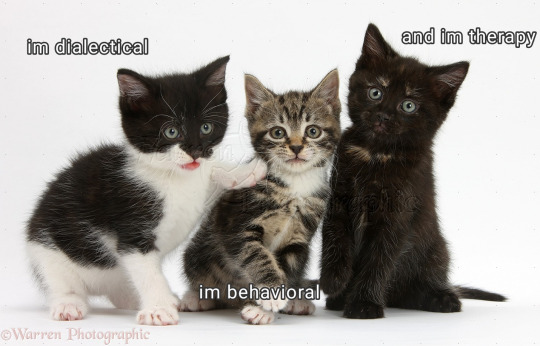#dialectical behavior therapy
Text
"the jedi don't have therapists-"
jedi philosophy, and in particular the practices and teachings that jedi were expected to implement in their everyday lives, was therapy. dialectical behavior therapy (dbt), to be exact. anyone who's familiar with dbt knows where i'm already going with this, but like genuinely look up the basic tenets of dbt and it's identical with what the jedi were doing.
dbt, to put it simply, is a specific therapy technique that was designed for ptsd and past trauma. it's pretty different from traditional talk therapy. it combines a few different environments (individual, group, etc.), recognizing that no single format of treatment can stand alone.
the key focuses of dbt include:
emotional regulation- understanding, being more aware of, and having more control over your emotions
mindfulness- regulating attention and avoiding anxious fixation on the past or future
interpersonal effectiveness- navigating interpersonal situations
distress tolerance- tolerating distress and crises without spiraling and catastrophizing
i'm sure it's already clear from that list alone how much the jedi teachings correspond with the goals of dbt. the jedi value, teach, and practice the following:
identifying and understanding emotions
mindfulness and living in the present
compassion, diplomacy, and conflict resolution (on interpersonal scales, not just planetary or galactic)
accepting and tolerating certain levels of distress or discomfort (particularly mental, such as discomfort at the thought of losing a loved one to death)
idk man seems almost as if jedi mental health practices and dbt are two sides of a completely identical coin. (fun fact: both star wars and dbt are products of the 70s.)
and guess what? dbt was specifically designed as a treatment for borderline personality disorder. remember that one? or, if you don't, maybe you remember a specific character, the one who was literally used as an example by my professor in my undergrad psych class when she was teaching us about bpd?

tldr: simply existing within the jedi community, practicing jedi teachings, surrounded by a support network of other jedi of all life stages, was the therapy for anakin. even when viewed through a modern lens. it was even, more specifically, the precise type of therapy that has developed in modern times to treat the exact types of mental issues he was struggling with.
#dbt#dbt therapy#dbt skills#dialectical behavior therapy#bpd#borderline personality disorder#anakin skywalker#anakin#star wars#sw#prequel trilogy#prequels#jedi#jedi culture#jedi philosophy#pro jedi#jedi appreciation#jedi order#attachment#non attachment#mindfulness#in defense of the jedi
3K notes
·
View notes
Text
That one trend but it’s one increment at a time bc rejection sensitivity dysmorphia has me scared of looking like an idiot with 4 notes ahaha
50 notes & I will
drink more water (easy since I drink like none ever)
regularly post lil hydration reminders
set a new goal
#idek how to tag this#that one trend#if this gets notes#stay hydrated#does this count as body doubling lol#audhd things#autistic things#adhd life#executive dysfunction#autistic self care#self care#adhd autistic#autistic borderline#neurodiversity#undiagnosed chronic illness#self improvement#baby steps#goal setting#audhd creature#dialectical behavior therapy#post traumatic growth#cptsd healing#trauma recovery#autistic system#did osdd
56 notes
·
View notes
Text
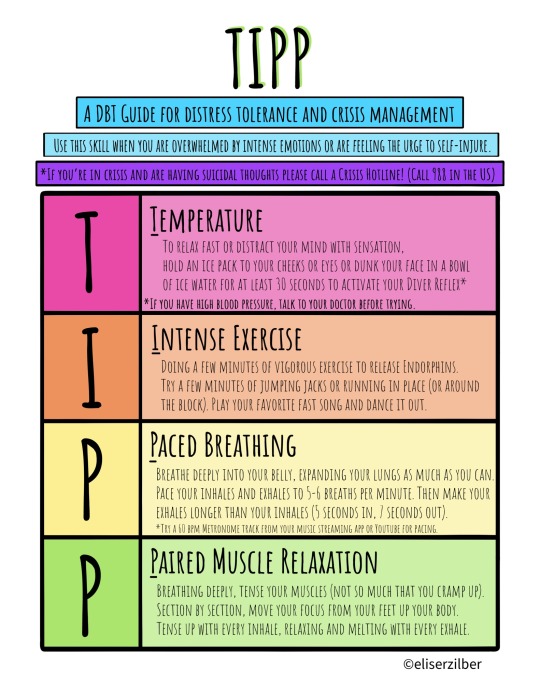
TIPP
Use this skill when you are overwhelmed by intense emotions or are feeling the urge to self-injure.
*If you’re in crisis and are having suicidal thoughts please call a Crisis Hotline! (Call 988 in the US)
T - Temperature: To relax fast or distract your mind with sensation, hold an ice pack to your cheeks or eyes or dunk your face in a bowl of ice water for at least 30 seconds to activate your Diver Reflex*.
*If you have high blood pressure, talk to your doctor before trying.
I - Intense Exercise: Doing a few minutes of vigorous exercise will release Endorphins. Try a few minutes of Jumping Jacks or running in place (or around the block). Play your favorite fast paced song and dance it out.
P - Paced Breathing: Breathe deeply into your belly, expanding your lungs as much as you can. Pace your inhales and exhales to 5-6 per minute. Then make your exhales longer than your inhales (5 seconds in, 7 seconds out).
*Try a 60 bpm Metronome track from your music streaming app or YouTube for pacing.
P - Paired Muscle Relaxation: Breathing deeply, tense your muscles (not so much that you cramp up) section by section, move your focus from your feet up your body. Tense up with every inhale, relaxing and melting with every exhale.
*More DBT guides here*
#dbt#dbt guide#dbt skill#dbt skills#dialectical behavior therapy#therapy#resource#resources#bpd thoughts#actually bpd#bpd#borderline pd#borderline personality#bpd life#bpd problems#bpd shit#bpd stuff#crisis plan#crisis management#distress#tolerance#distress tolerance#TIPP#tipp skill
98 notes
·
View notes
Text

#dbt#dbt therapy#dialectical behavior therapy#bpd#actually bpd#actually mentally ill#actually borderline#borderline personality disorder#bpd meme#bpd mood#bpd shit
137 notes
·
View notes
Text
STOP living your life in accordance to other people’s approval of you. START living your life in accordance to your approval of you. Do you like yourself? Do you like things you say and do? What do you want out of the people around you? What things can you do to help make your life easier? What things make you happy? Cease looking for someone else’s answer to those questions, and start answering them yourself.
#dbt skills#dbt#dbt therapy#dialectical behavior therapy#therapy#life skills#building a life#life worth living#get some rest#op#advice
58 notes
·
View notes
Text
If you are like me and live with BPD, I’m sure you may have at least heard of DBT. Dialectical Behavioral Therapy is the type of therapy that has really turned my life around, so I’d like to make a Masterlist of resources both free and with cost.
FREE RESOURCES FOR LEARNING DBT:
A great website that teaches the skills is ⬇️
A great YouTube channel that has videos of Marsha (the creator of DBT)
A great podcast that teaches and discusses the skills is:
DBT RESOURCES THAT COST MONEY:
This is a great easy to learn card deck with the skills explained in concise ways.
This is a great workbook. It was made BY the lady who CREATED DBT.
This is a great book that delves into DBT at its core (and isn’t so much activity focused vs. explaining each skill)
That’s it! I’m not saying this type of therapy is FOR SURE going to be the right therapy for you, but it’s SO worth trying if you have Borderline Personality Disorder like me.
Hopefully this helps someone!
-Velvet Rose Kthonia 🥀
#DBT#dbt skills#dbt therapy#DBT resources#therapy#dialectical behavior therapy#resources#free#paid#mental heath support#BPD#actually BPD#borderline personality disorder#Spotify
32 notes
·
View notes
Text
You see, the acting-out, the yelling, the screaming and even the hitting, all that a person does, serves as a defence against the experience of the anger. It’s a defence against keeping the anger inside where it can be deeply felt. Discharge defends against anger being actually experienced.
Gabor Maté, When The Body Says No
#Gabor Maté#emotions#feelings#repression#repressing#numbing#anger#rage#yelling#acting out#DBT#dialectical behavior therapy#recovery#healing#personal growth#personal development#When The Body Says No#quotes
111 notes
·
View notes
Text
TW: mental health stuff, abuse, rape, suicide attempts, self harm
A little something personal:
On this day last year, the amazing therapist in my intensive outpatient therapy program told me that they would be declining to renew my borderline personality disorder diagnosis.
In shorter hand, that means that one year ago, I officially recovered from BPD.
I have been in therapy since I was 16, I’m 22 now. I was diagnosed with borderline personality disorder when I was 17. I’ve been on countless medications.
My intensive outpatient therapy program was 3 months of intensive therapy. I was doing 10 hours of therapy a week, in addition to working 40 hours a week and going to 3 college classes that semester.
2021 was one of the worser years of my life. (In order) I attempted suicide and was hospitalized, I was raped, I was broken up with by a long term partner (not my rapist + who I lived with at the time) and had to move across the country, I was diagnosed with an autoimmune disorder, I was dealing with pretty severe flare ups of my physical disability and had to get *regular steroid injections into my spine, I dropped out of college for the second time because of the move, I fell back into my self harm addiction.
Now, let’s move to 2022-2023.
There were all sorts of odds against me, but somehow, I crawled my way into creating a more stable, healthy life where I life now, into new friendships, a new university, a new job, I enrolled myself in that intensive outpatient program and I advocated for my mental and physical health to a variety of doctors who were intent on telling me I wasn’t disabled because sometimes I can walk, and to the insurance company convinced that I could go without the immunosuppressants my doctor prescribed and refused to cover them.
Recovery from BPD is possible. It’s hard work, some of the hardest work I’ve done, and recovery won’t ever stop. The borderline wiring in my head and the damage done to my personality cannot ever be undone. But through therapy, I have been able to overcome many of symptoms and drop below meeting 5 of the diagnostic criteria for BPD. At one point in my life, I met all 9. I will always wrestle with all the negative internal shit and some day, I might even slip back into BPD. But I will always do my best to fight my way back. Recovery from BPD is very much like recovering from addiction; you can stop engaging in that specific addiction, but you never lose the addictive pathways in your brain.
I am IMMENSELY proud of myself and all the work I’ve done.
I want to thank Dialectical Behavior Therapy and Dr. Marsha Linnehan (who created it). DBT saved my life and continues to save my life. I have done it consistently since I was diagnosed with borderline personality disorder and not only has it helped me recover from BPD, it also helps me manage and function with my autism. I use DBT skills everyday and I am so grateful that DBT helps me be someone who is a positive influence in other people’s lives, that DBT has taught me self awareness, emotion regulation, cognitive empathy, and accountability. I wouldn’t have the close relationships I have today (that have also saved my life) without the skills DBT has helped me grow.
I also want to thank all of my friends who’ve stuck with me, helped me, taken me in, and given me something to live for. It was friends who helped me move away from the city where I’d been raped in and broken up in. It was friends who helped me find apartments, who said I could come over when I was feeling suicidal, who have supported me through getting my autoimmune disorder diagnosis and fighting my insurance company for immunosuppressants. I love you all very, very, very much.
I hope to see y’all here in 2024 🥹🫡🌹
65 notes
·
View notes
Text
i often find the language of dbt to be extremely alienating to people with cluster b pds and its such a shame because the concepts themselves do genuinely work
gratitude for example, telling people who've been abused their entire lives "u just have to focus on what ur grateful for" or having us write lists of things we're "grateful" for often feels kind of like a slap in the face. "being grateful" is often a thing used against abuse victims to keep us complacent. we always have to be "grateful" something wasn't worse instead of being allowed to acknowledge the pain we've been put through. it's a touchy word for a lot of us
but the *concept* that dbt "gratitude" is proposing is actually just perspective. life is a constant flow of experiences, some are good, some are bad, and it's very very easy to see the bad things that happen. they hurt and suck and so u remember every little one that happened in ur day and so its easy to get swallowed up by them and feel like ur life is nothing but bad things. on the other hand noticing the small good things is a lot harder and takes some practice, but once u start doing it u realize that ur day to day life is much more balanced than u thought it was. there are suddenly more good things that ur taking notice of that are now at the forefront of ur mind and shit doesnt feel so hopeless and desolate. it helps to give u a better and more balanced perspective
framed that way i think a lot more people understand and can resonate with it. instead of "learning to be grateful" its about "actively acknowledging small things that make u happy" which is much more tangible of a goal for a lot of people. taking the time to appreciate the cool bug u saw or the cat u got to pet or that really good song u heard or cup of coffee u had, teaching people to stop for a second in those moments and acknowledge "hey this is good, this made me happy" is what the core concept of gratitude is trying to teach. but i just feel like the language it uses to try and do that is ultimately really ineffective for the people it was designed to help
294 notes
·
View notes
Text
Possibly one of THE most frustrating things about experiencing cognitive awareness whilst having hallucinations/delusions/splitting episodes is getting that feeling, as if you're in the passenger's seat of a car, you've just looked over to the driver's seat to see nobody there, so you try to move to grab the steering wheel, but you're bound by invisible chains that shackle you to the passenger's seat as the car you're in speeds down the road, so your only hope to make it out alive as you struggle against the invisible chains is either that you suddenly grow superhuman strength and bust out, or you wait for the car to eventually crash or run out of gas so you can cry for help from horrified bystanders.
Or maybe that's just a personal thing because this entire scenario is based on a recurring dream I've had since I was a little girl that has followed me into adulthood, who knows
#bpd#borderline personality disorder#actually bpd#bpd awareness#hallucinations#delusions#delulu#cluster b#cluster b personality disorder#personality disorder#cognitive skills#cognitive behavioral therapy#dbt#dialectical behavior therapy#adhd#diary entry#my thoughts#personal anecdote#dreams#recurring dream#dream journal#dream interpretation#mental health#mental illness#dark academia#light academia#gothic academia#chaotic academia#creative writing#journal entry
7 notes
·
View notes
Text
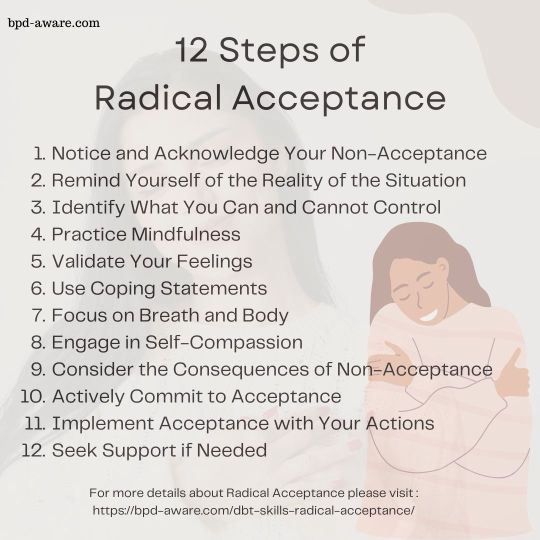
#dbt skills#dbt#dialectical behavior therapy#bpd#borderline personality disorder#cluster b#mental health
9 notes
·
View notes
Text
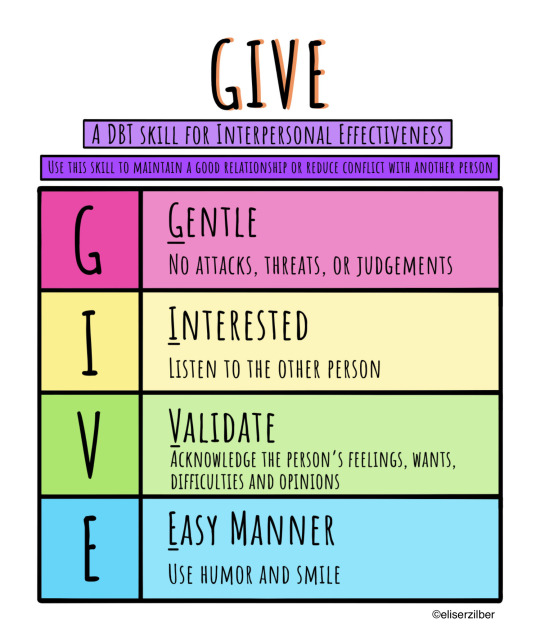
GIVE
Use this skill to maintain a good relationship and reduce conflict with another person.
G - Gentle: No attacks, threats or judgments.
I - Interested: Listen to the other person.
V - Validate: Acknowledge the person’s feelings, wants, difficulties and opinions.
E - Easy Manner: Use humor and smile.
*More DBT guides here*
#bpd life#borderline personality#borderline pd#borderline problems#bpd stuff#bpd problems#bpd thoughts#bpd fp#actually bpd#dbt group#dbt skills#dbt therapy#dialectical behavior therapy#communication skills#skill#give#give skill#gentle#listen#mindful#mindfulness#interpersonal skills#interpersonal effectiveness#interpersonal relationships#relationship#interpersonal communication#interpersonal relation#communication#resources#dbt
25 notes
·
View notes
Text
On New Ideas
Listening to concepts you have never heard before is going to be uncomfortable & might even be painful, so I suggest you allow yourself to be uncomfortable and continue engaging with the ideas and the person/people delivering them anyway. Your discomfort arises upon arrival to these conversations because the information is new to you. That's an evolutionary process we are ingrained with at birth in order to detect danger. It is just an instinct. You don't need to let it control what you do, what you say, and how you interpret the information presented to you.
Pay attention! Is the information coming from a trustworthy source, and are you going to check if you're not sure? Is the information being presented in good faith, skillfully, candidly, and with the intention of collaboration of ideas to a mutual understanding as a means of creating tangible societal change? Does the presenter/s seem unsure of themselves? Take note of tone of voice and body language, but do not assume their meanings. Ask questions! Ask them questions to broaden your understanding of the person/s and the material, not to react to, interrupt, redirect, minimize or dismiss. Bring up how you're feeling about what is being presented to you. Bring up what you don't understand. Work together against the misunderstanding, not against each other.
Be prepared to learn the hard way. Sometimes you will walk away from a discussion feeling discouraged, insecure, maybe even attacked, and you must not only acknowledge that you feel this way, but also work to extinguish it as a knee jerk reaction. The more you invite unpleasant feelings to stay for awhile and then leave when they are due to leave, the less power they will have over you. You will have to deliberately steer yourself into a distraction when the feeling/s become unhelpful, such as when they are being dwelled upon, creating anxiety, depression, paranoia, restlessness, etc.
Know when to take a break or disengage. If you are becoming reactive, short, agitated, stubborn, or another acted upon feeling that is preventing progress in the discussion, step away for a few minutes (this does not mean abandoning the conversation altogether, it means creating a brief pause and then coming back to resume it.)
If the other person or people is/are showing signs of these and won't back away, then it is time to disengage. Politely assert that the discussion cannot progress at this time and that you will be ending it. Assess if your relationship to the person/people giving you the information is worth keeping - this will indicate whether or not you will be coming back to the discussion later and you must provide this information so as not to mislead others. It is far less regrettable to communicate healthy boundaries clearly, firmly, and kindly and receive a bad reaction than it is to omit your intentions from others for the sake of self-perceived peace; people-pleasing kills intimacy, trust, and understanding. Let others know what your future plans are with them moving forward.
I hope this information helped you. I have about 5 years of experience with DBT (dialectical behavioral therapy) and the skills presented in it are proven to be highly useful across a vast range of psyches. My posts like this one are heavily influenced by this school of thought. More coming soon! I love talking about how to communicate, emotionally and physically regulate, and creating a life worth living! Stay tuned baddies 🫶🏻🫵🏻❤️🔥
#op#actually bpd#bpd thoughts#disabled#bpd mood#bpd stuff#borderline blog#on the borderline#borderline thoughts#borderline personality disorder#bpd#BPD help#DBT#DBT skills#DBT therapy#dialectical behavior therapy#healthy debate#debate#discussion#collaboration#active listening#skillful#community building
9 notes
·
View notes
Text
So, I haven’t said anything but I crashed hard a few weeks ago when I left the hospital…I had a massive, 8-hour long panic attack and had to go back in. I have been in here essentially for a full month, and I am to be released again in a few days. I missed Thanksgiving and I have missed the bulk of the Christmas season because I’ve been in a hospital and not with my 8 year old son. I am bitter and angry about it, and for most of this time I blamed myself for it. But that is starting to fade, and I realize I had no control over it…the only think I could do was seek immediate, intensive treatment before things got to the point they would be life-endangering.
The nice think is that I will be walking into a nice long 2 week break with my family, then return to work on January 2. I start intensive DBT therapy around that time also. (Which I don’t know much about yet.)
The docs further changed my meds, got rid of another that wasn’t helping, and added an augmenting one…I think it is really working. I have felt better in the last few days than I have for a long time, and the nurses have said the same thing…that I have light in my eyes they haven’t seen since I was released from here a year and a half ago. And the best part is that I went a full “cycle��� with very few hormonal side effects.
I am ready to get my life back and actually do social things, which is a big deal. One day at a time, and repairing as much as I can as best as I can.
I hope everyone has a wonderful holiday season.
#personal#inpatient#depression#anxiety#double depression#perimenopause#dbt#dialectical behavior therapy#Me venting to myself again
9 notes
·
View notes
Text
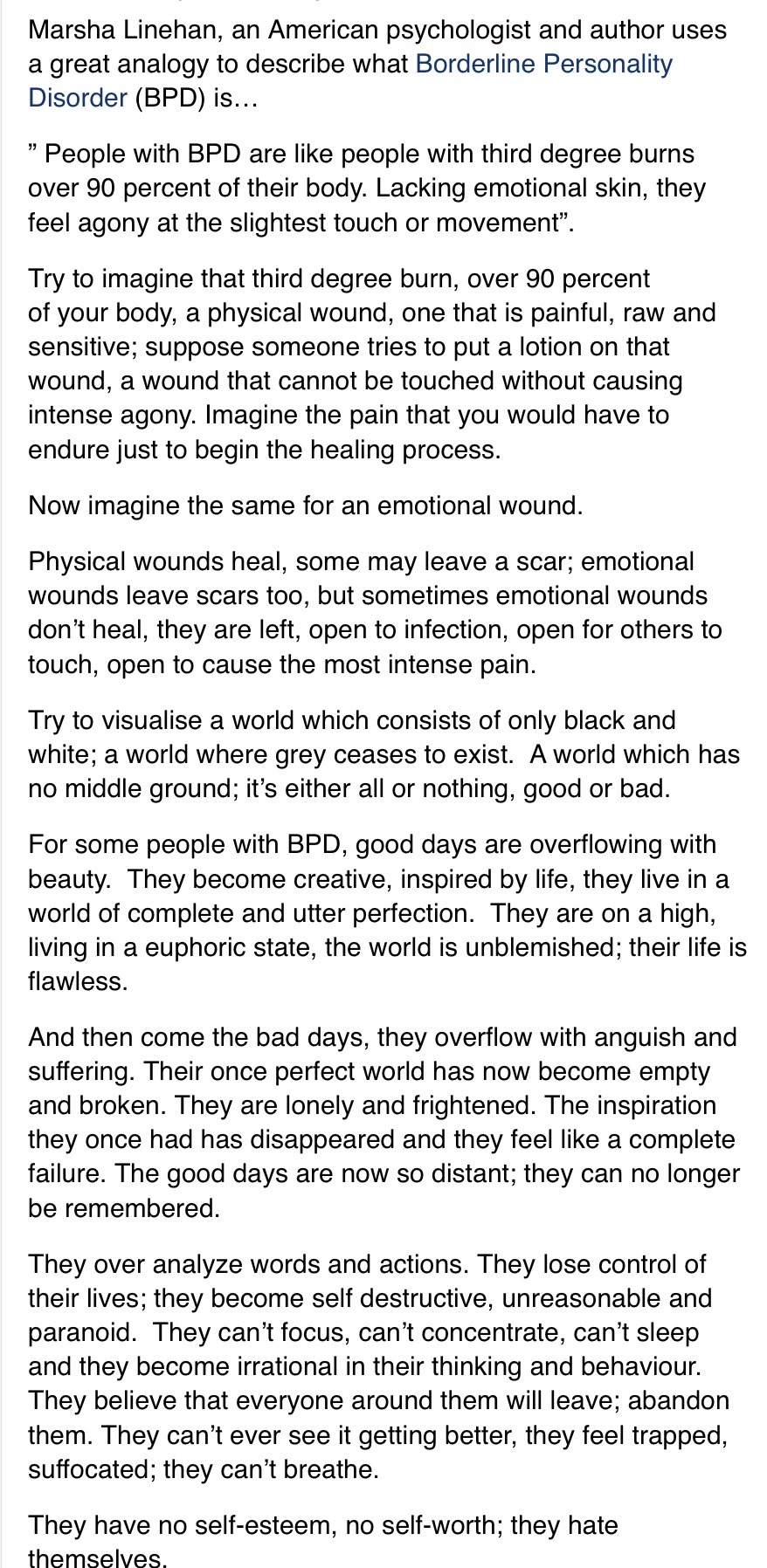
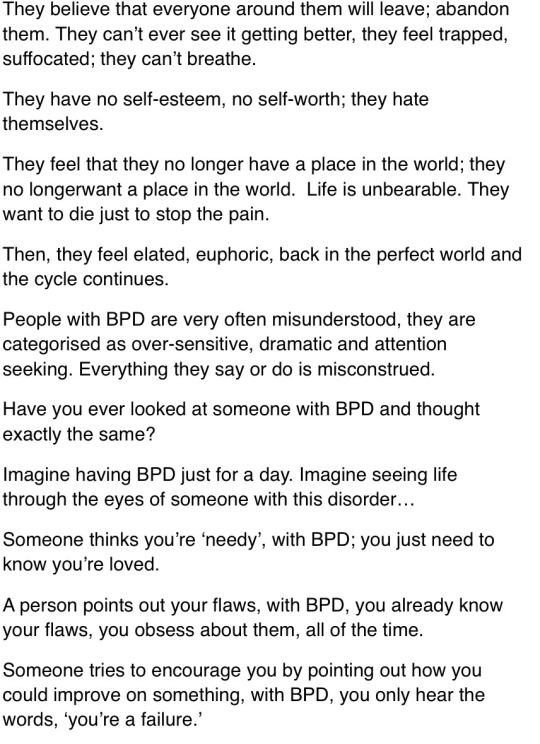

what a touching read. to feel validated in the intensity of my feelings as someone suffering an emotional disorder. every sentence resonated.
marsha linehan is a psychologist credited with developing dialectical behavioral therapy (DBT) which ive been told throughout my entire hospital stay by many drs i would greatly benefit from. every time i seek treatment, the acronym ‘dbt’ is always recommended to me over other courses of therapy and reading words from the woman herself, i can see why. this specific approach realizes and adjusts to the fact that bpd emotions are extreme emotions, and that the feelings and thoughts that we cannot control having are just that - out of our control. dbt focuses on what can be in our control in order to cope with intense splits, such as remaining focused on your present surroundings and recounting the facts.
this is my first time reading of the ‘burn analogy’ and at first i felt it was wrong comparing my emotional traumas to the physical suffering of someone with a very real, painful condition and then i thought more to myself and i was like.. no, just because my pain is not visible, because people cannot look at me and tell instantly i am in a great deal of pain - it doesn’t mean my pain isn’t real and my suffering isn’t comparable. it is. the sensitive layer of skin that has been burned and is now extremely fragile & sensitive is entirely comparable to the fragility of my mental state and strength of my emotions vs triggers and episodes. no matter what , i will always be sensitive and my mind won’t always be rational. and i can feel like it’s my fault as much as the disorder wants, but it’s just.. not..
what is my fault is how i go forward knowing what my triggers are and how i react to them. what is up to me is how i get myself through intense episodes and learn how to not feel like my world is falling apart, thrusting me back into the depths of depression from the constant reminders of the emotional stability i lack. if i split and i implode and i feel and think and say these terrible and intense things, i can still apply techniques taught in dbt to recenter myself in reality instead of letting my spiral continue.
it’s important you go with a therapeutic method where you can firmly stand by what the developer’s goal is. my goal is not to NOT be emotionally unstable, it’s unrealistic and frankly unachievable as the period of my life meant for developing emotional maturity has already been tainted. the goal is to not let that instability ruin other aspects of my life, to remind myself that no matter what evil and negative things i feel inside - i am loved and im part of peoples lives and i deserve to not feel like i am a bad person for never being taught how to handle these traumas. it’s not too late to start learning
#recovery#living with borderline#borderline personality disorder#bpd#actually mentally ill#dialectical behavior therapy
23 notes
·
View notes
